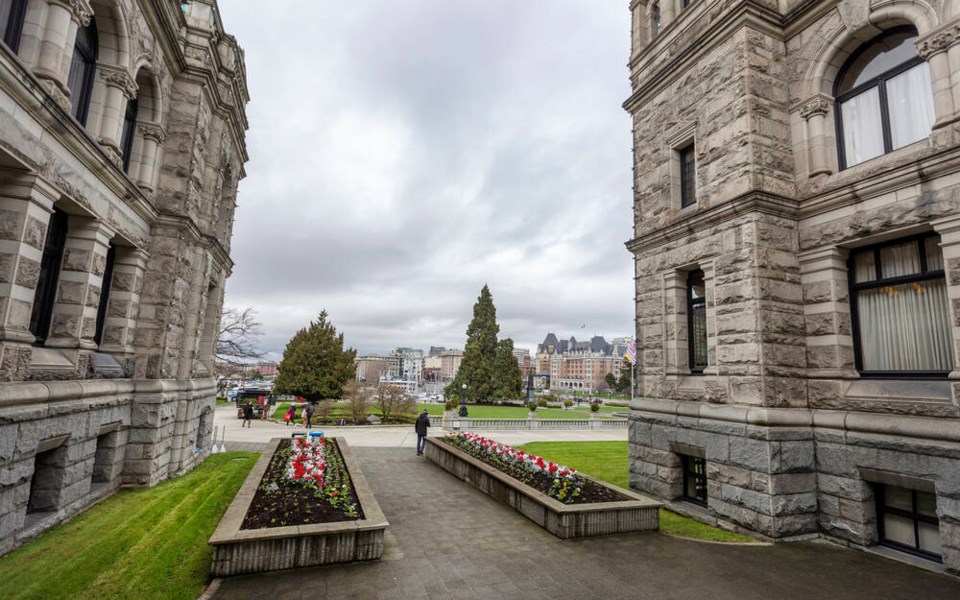It’s not often a government opens the first full day of a legislative session with an angry capitulation.
On Tuesday, the NDP government confidently promised grand advances on all fronts in the throne speech.
On Wednesday, they sulkily announced a major retreat. Key changes that were planned to land-use law to recognize B.C.’s formal adoption of the UN Declaration on the Rights of Indigenous Peoples have been parked indefinitely.
Despite constant government reassurances, the concern and suspicion have been building around B.C. for weeks about the impact of amendments that reflect First Nations’ new clout. So on the first full day of the sitting, the NDP gave up the “no story here” approach and suspended the idea of making the amendments law this spring.
Nathan Cullen, minister of water, land and resource stewardship blamed the surrender on “misinformation, disinformation and fear mongering” manufactured by the opposition. “It was distasteful, very unfortunate, and quite damaging. The dog whistle politics was quite abhorrent,” he said, referring to the use of coded language to stoke fears, often related to minorities.
The gaping hole in his explanation as to how his initiative ran so badly off the rails relates to the cavalier, dismissive way he slapped together a superficial engagement process to explain what he was doing to a law that governs what happens on Crown land, which is 95 per cent of B.C.
It was quietly fronted on a government website in early January with the most minimal attention possible, and no formal news announcement. It took the Vancouver Sun’s Vaughn Palmer to drag it fully into public view.
A relatively short 12-week time frame was offered for comment. It was dwarfed by the intensity of the concerns that have developed since then.
The changes would have allowed the ministry to enter into agreements with First Nations regarding land in their traditional territories. They would have also granted cabinet authority to establish processes leading to agreements that “have the force of law.”
Final say on many land-use decisions now rests in the office of the minister, who has a duty to consult with Indigenous authorities.
The question of the V-word has been lurking in the background since the B.C. legislature unanimously accepted the UN Declaration as a guiding principle of reconciliation four years ago.
As in: Does UNDRIP create a veto power for First Nations?
The government and First Nations say no.
But part of the concern that has been building since January is based on this belief: yes, it does.
The BC United caucus has changed its tune since that dramatic, dawn-of-a-new-age day in 2019 when everyone stood and supported UNDRIP.
Opposition Leader Kevin Falcon on Wednesday referred to the NDP’s “flawed, dangerous hidden” agenda and warned that they will pursue the changes if BC United wins the provincial election in the fall.
“Public land belongs to all of us and we will fight to keep it that way.”
B.C. Conservative Leader John Rustad, a former Indigenous relations minister who also voted in favour of the reconciliation bill, has also flipped.
“Eby still wants to take away your property rights,” he posted after the retreat was announced.
Green Party MLA Adam Olsen said the NDP mishandled the implementation process and the other opposition parties acted “despicably” in exploiting fears.
The amendments are suspended indefinitely and the situation leaves First Nations in the middle of a political fight not of their own making, he said.
Green Leader Sonia Furstenau contrasted how the NDP has rammed numerous bills through the legislature by cutting off debate, but has now suddenly abandoned one that looked to be problematic as the election nears.
Cullen has previously acknowledged that some of the backlash is aimed unfairly at First Nations.
To his credit, he has also admitted he dropped the ball with the hasty low-profile consultation process.
So what he thought would be a pro forma exercise to shepherd a bill into the legislature by mid-March has blown up in his face, embarrassed the government and put unfair pressure on the people it was supposed to be supporting.
He was the officer in charge of executing the task and he botched it. It’s mildly surprising he still holds rank.
>>> To comment on this article, write a letter to the editor: [email protected]


